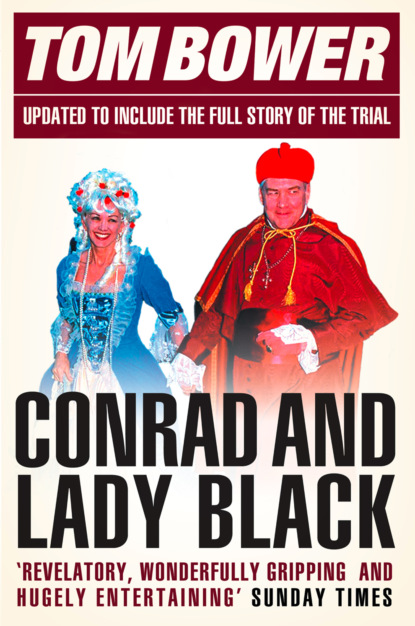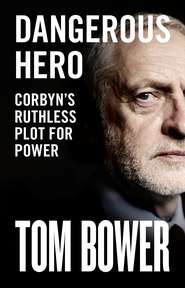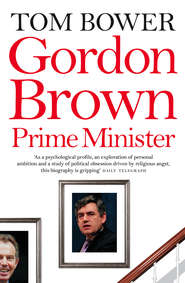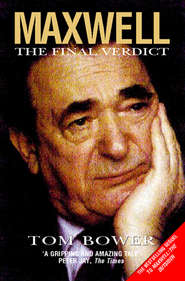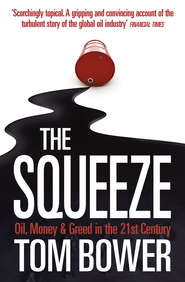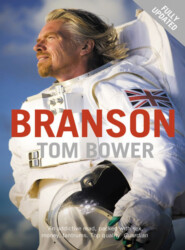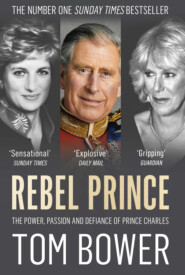По всем вопросам обращайтесь на: info@litportal.ru
(©) 2003-2024.
✖
Conrad and Lady Black: Dancing on the Edge
Настройки чтения
Размер шрифта
Высота строк
Поля
Besides his father and Bud McDougald, there was a third formative influence on Conrad Black: the lessons of history. Even before his teens, Conrad admired from his copious reading the rise from obscurity to immortal fame of giants who irreversibly changed mankind’s fate. Egoistic self-righteousness, he realised, could overcome adversity, and popular acclaim bestowed permanent glory. The mere appearance of Napoleon or Abraham Lincoln among soldiers and supporters had raised hopes and entrenched loyalty to the leader. History’s heroes, Black learned, exploited their opponents’ weaknesses, outwitted their deceptions, manipulated their ambitions and assembled a coalition of allies to secure victory. Nurturing his own fantasies of eventually standing in the limelight and enjoying similar grandeur, he awaited his chance for revenge. Patience, planning and perfidy would be required to destroy his father’s tormentors.
On most days George Black would awake in a melancholic daze at lunchtime, spend the afternoon speculating on the markets, and after dinner would watch television while drinking himself into a stupor before his long night-time conversation with Conrad. Just before daybreak he would climb the stairs to his bedroom. His wife Betty, a sports enthusiast from the Riley family, whose wealth came from insurance and finance, had little in common with her husband. In recent years, barely tolerating a man who rarely emerged from his house or met visitors, she had condemned her husband as a self-righteous snob and disappeared into her own rooms. Their unpleasant co-existence was interrupted in September 1975, when Jean Black was diagnosed with terminal liver cancer.
Eight months later, Conrad, Monte, his elder brother by four years, and their father, accompanied by a nurse, flew with the dying woman in a private plane loaned by Argus to Bermuda, which Jean had always dreamt of visiting. Shortly after their return, on 19 June 1976, she died. George Black declared himself too ill to stand by her grave. After the funeral the mourners returned to the family house, to be told that George was too sick to appear at the wake. Only his closest friends remained when he finally emerged, depressed and showing little will to live. ‘Are you planning a trip during the summer?’ asked one, Douglas Bassett. ‘Yes,’ replied Black. ‘To the dentist in late July.’
Ten days later, after another night-time discussion with Conrad, George Black slowly climbed the stairs. As he reached the top, his son heard cracking wood, and saw his father fall over the banister onto the ground floor.
(#litres_trial_promo) Carried by Conrad into the library, George Black said that he no longer had the will to live. ‘Life is hell,’ he told his son as they awaited the doctor. ‘Most people are bastards, and everything is bullshit.’ The doctor’s diagnosis was bleak. His father, Conrad was told, was unlikely to survive. Despite the prognosis, Conrad returned to his own home and watched a Charlie Chan film. His viewing was interrupted by a telephone call. George Black, the doctor announced, was dead. Many, occasionally including his son, believed that he had committed suicide. At thirty-two, Conrad Black was an orphan with a purpose.
Toronto’s financial leaders gathered for George Black’s funeral. The pall bearers, who included all Ravelston’s directors, were led by Bud McDougald and E.P. Taylor. Conrad watched McDougald with particular interest. While he admired ‘the ultimate Canadian tycoon’,
(#litres_trial_promo) he recognised that he represented Canada’s ‘corporate rot’, and that his fortune had been earned in a uniquely dishonest manner called ‘tollgating’.
(#litres_trial_promo) Conrad’s later pious denunciation of the legend’s ‘venality and self-delusion’ at his father’s graveside did not undermine his endorsement of McDougald’s crushing piety: ‘Some are chosen, some are not.’ In the jungle, Conrad Black was committed to stand among the chosen.
Bud McDougald, like Ravelston’s other major shareholders, Black noted, had no children. Their wives were uninterested in business. Those circumstances would be his opportunity. Ingratiating himself with the older directors was not a chore, but rather an investment. Among Conrad Black’s skills was flattering old, lonely, rich people.
After their father’s funeral, Conrad and Monte Black called on Bud McDougald, who controlled the fate of the two young men’s assets. To Conrad’s relief they were ‘welcomed most graciously’. Whereas Conrad had condemned McDougald as a ‘snob, bigot … and an unlearned reactionary’ who had succumbed to ‘jet-addicted decadence’, on that particular day he encountered ‘an elegant and considerable figure’.
(#litres_trial_promo) After a brief discussion the brothers emerged with a satisfactory deal. Conrad was given a directorship of Argus and Ravelston, while Monte was given directorships of other companies. As if to confirm his younger brother’s intellectual superiority, Monte agreed that Conrad should inherit their parents’ grand house amid seven acres in Bridle Path’s Park Lane Circle. The house matched Conrad’s ambitions. Unlike Monte, an unthreatening bon vivant with a fondness for big cigars, fast cars and good food, Conrad’s dream was to join the establishment and to control an empire matching those of Canada’s principal families, including the Eatons, the owners of the country’s dominant department store chain; the Westons, who owned a food and retail business; the Bronfmans, whose fortune was built on alcohol during the Prohibition; the Thomsons, the media family whose assets included the Times newspapers in Britain; and the investors Paul Desmarais of Power Corporation and Hal Jackman, the inheritor of a large investment fund.
(#litres_trial_promo) Stuck on the periphery, Conrad Black hoped to use his inheritance to become a power on Bay Street and a member of Toronto’s financial mafia. His life over the previous thirty-two years had been a preparation for that struggle.
Privilege and prejudice had been Conrad Black’s roots since his birth in Montreal on 25 August 1944. By the age of five, when the family moved to Toronto, he was cosseted by cooks, butlers, nannies and chauffeurs. In the winter holidays he escaped Toronto’s freeze in the Bahamas. At Nassau’s Porcupine Club he gazed with his father at the Mellons, du Ponts and other American magnates. Although George Black did not rank among the super-rich, he was a successful businessman with an astute intellect. Well-read, and always irritated by those who misused the English language, he noted his son’s exceptional gifts and became preoccupied with creating an extraordinary individual out of him.
Obsessively he ordered Conrad to recall facts, both relevant and irrelevant. After intensive games of chess, his son was encouraged to read encyclopaedias and, like himself, recall what he read. Conrad’s bedrooms were filled with books about the military, wars and politics. He learned not only the names of the world’s ships, both commercial and naval, but their weight, armour thickness and guns. In the midst of the Korean War Conrad Black sat transfixed listening to David Brinkley’s news broadcasts, and watched the television reports of the McCarthy hearings in Washington targeted at unearthing Communist sympathisers. Influenced by his father in favour of capitalism, he grew up with a hatred of those on the left, whom he later damned as ‘phoney, envious and mediocre bleeding hearts whining and snivelling about meritocratic Darwinism’. Nowhere in Black’s education or experience was there any sympathy for the anonymous, simple, honest masses born underprivileged and without special talents. On the contrary, there was boastfulness when in 1952 his father arranged his purchase of a single General Motors share costing $59. The eight-year-old Black had dollar bills spilling from his pockets. When one fell into the mud, he carefully washed it. His journey across the Atlantic on the Queen Elizabeth the following year to watch the coronation in London enhanced the image of a spoilt child taking luxury for granted.
From the age of eleven the unsporting, overweight Black was driven every day to Toronto’s Upper Canada College, one of the country’s elite private schools, in a chauffeur-driven Cadillac. Awkward and isolated, he was not a natural enthusiast for a society focused on conformity and obedience. During his school day he could be certain that his family’s servants were cleaning his room, washing his clothes and preparing his dinner. Occasionally the chauffeur returned to serve lunch in the limousine. Voices, books and images conjured up for the young Black a romantic fantasy of enjoying the same unlimited power as history’s titans, assured that whatever he willed would be carried out. Entitlement bred defiance and insolence, fashioning a personality which enjoyed a fight and savoured inflicting defeat. Black’s childhood, remarked John Fraser, a school friend, was like prison for a pre-teenager convinced that he was smarter than the system.
(#litres_trial_promo)
The scoffs directed at the tubby outsider, Conrad believed, were driven by ‘spite and envy’, one of the oft-repeated phrases that encapsulated his life’s credo. His encyclopaedic knowledge, he assumed, was resented, reinforcing his sense of superiority and hatred of regimentation. He construed his teachers as remote from reality, and their authority as a misuse of power. History, he believed, showed how those exercising authority were flawed. Success was won by those who were unwilling to obey laws. Those who failed to admire him were dismissed as despicable. Teachers whom he judged to be inferior excited his contempt. Defiance, in Black’s interpretation, showed courage. His insolence did not pass unpunished. Regularly he received corporal punishment on his backside or hands with rulers, slippers and even a riding crop. The ‘official terror’, he later recalled, imposed by flagellators, homosexuals and failures transformed him from a ‘sceptic to a rebel, an insurrectionist and an anarchist’.
(#litres_trial_promo)
There was equal hatred of his fellow pupils who succumbed to the teachers’ tyranny. Black promoted himself as the spokesman against the sadism of his inferiors. ‘This school is like a concentration camp,’ he told John Fraser in the midst of a typical fury. ‘E.P. Taylor could buy this silly place fifty times over. He’d subdivide and make some money off it.’ Fraser and others were baffled by Black’s anger. Life at Upper Canada was little different from that at other schools. The school’s summer camp motto: ‘In the boy is seen the man’ – would prove to be remarkably pertinent.
In May 1959 the school was being rebuilt, and the fourteen-year-old Black spotted lax security in the administrative offices. One night, with little consideration of the consequences, he returned to the building and picked the lock of a room containing the records of the cadet corps. In the hope of avoiding military duty and sport, he removed his own records. On a subsequent night he broke into the room of a teacher whom he particularly disliked and altered the records of some pupils, and in another break-in he copied out the academic records of many pupils. His success bred an outrageous plot to steal and sell the school’s final examination papers.
With two other pupils, he broke into the school’s main office, pocketed the examination papers and used his knowledge of other students’ weaknesses to offer them the relevant papers for an appropriate price. Those in greatest need paid the most. With an exaggerated sense of his own skills, the trademark of any buccaneer, he was excited by the risks he was running. He staked everything on an attempt to demonstrate his bravado and his uniqueness. Thirty-four years later, he would proudly admit to having ‘completely undermined the system’ and to have caused ‘utter chaos’.
(#litres_trial_promo) Blinded by contempt to the possibility of any flaws in his genius, his last throw was calculated to extract revenge for his injured innocence. He gambled that either the authorities were too stupid to discover his deeds, or that his expulsion would be a painless pleasure.
The extraordinary examination results that followed provoked questions, and Black’s role was discovered. Expulsion was inevitable. He felt no shame, and resisted accepting any blame. He dismissed the school’s principal as an ‘insufferable poltroon’, and derided his wife, whose parting words were that his ‘life was over’, as a ‘desiccated old sorceress’.
(#litres_trial_promo) He consoled himself that he had received ‘much moral authority by my failure’, and even John Fraser felt that he was ‘the hero of the hour’. Later, Black described his crime as ‘a fundamental subversive’ plot intended to undermine and overthrow a regime which he compared to that of Nazi Germany. His contempt for those pupils who had exposed his dishonesty matched his scorn for those who were outraged by it. The boys who had bought the stolen papers had wasted their money, but the honest students were also forced to retake the examinations. Black’s condescension towards the innocents, combined with a genuine grievance against those who burnt his effigy on the lawn outside his home, reflected his cavalier arrogance. ‘As I walked out of the gates,’ he wrote self-servingly thirty-four years later, ‘a number of students who literally twenty-four hours before had been begging for assistance – one of them on his knees – were now shaking their fists and shouting words of moralistic execration after me. I’ve never forgotten how cowardly and ungrateful people can be.’
(#litres_trial_promo) He blamed the teachers, the school and the system, denying any personal responsibility for his wrongdoing. On the Day of Judgement, Black expected those vilifying him to have to answer for their lack of faith in himself. He was entitled to their praise, not their scorn.
There was a distinctive aspect to Black’s crime. His home environment – the vengeful father, the ineffectual mother and his solitary adoration of history’s heroes – had created an individual who worshipped bronze effigies. Steeped in the blood and glory of history’s heroes, Black’s self-glorification justified trampling on the weak. In his philosophy, society’s masters were permitted to break laws. Veering off the beaten track was imbued in his character. With that notion implanted in his mind, he had lost the only impediment to committing a major crime – a conscience. Black the schoolboy imagined himself to be an unacknowledged genius entitled to break the law. ‘I am neither proud nor ashamed of what happened,’ he wrote. ‘It was an awful system whose odiousness was compounded by banality and pretension.’
(#litres_trial_promo)
George Black excused his son as a ‘compulsive insubordinate’ eager to prove his credentials as a capitalist.
(#litres_trial_promo) The school rejected that explanation, believing that the father was blind to his son’s reckless disregard for rules and morality. Spared any proper parental reprimand, Conrad waited for his mother and father to find a new school. Lonely, he remained in his bedroom listening to long-playing gramophone records of Franklin D. Roosevelt winning the wild applause of a crowd in Madison Square Garden for denouncing American capitalism, the rich and politicians’ deviousness, on his way to becoming President. Roosevelt, he would say admiringly, was a misunderstood hero, defiantly ignoring his physical paralysis to shape the world’s future.
Over the next four years Black passed through two more schools – leaving each because of misbehaviour – before being coached in a crammer to scrape a pass in his final school exams in 1962. His mediocrity reflected his laziness. His reliance on his father’s indulgence and finances was reflected in his unwillingness to focus on his study of journalism and then history at Carleton University in Ottawa, an inferior college. Lodging at the expensive Savoy Hotel in Ottawa rather than in student accommodation, he spent his days sleeping or listening to parliamentary debates, and sharing the hotel restaurant in the evening with senators. The consequence was inevitable. During the summer holidays in 1963, while he was visiting historic and literary sites in France with his elder brother Monte, the college warned that he risked expulsion. His schoolboy notions of genius had been shattered. Laziness had bred failure. Instead of returning to study he remained in France as a tour guide, and later travelled to Spain to meet Brian Stewart, a Canadian friend.
Black arrived in Spain depressed, admitting his inability to cope with life’s normal challenges. His initial escape from despair was to read a biography of the American newspaper tycoon William Randolph Hearst, the model for Orson Welles’s Citizen Kane. The combination of politics, history and power appealed to a dilettante seeking a purpose. In his fantasy, the ostracised upstart dreamt about basking in public adoration. Whatever he said would be believed because he uttered the last, irrefutable word. Undecided whether he should become a historian or try to earn some money, he resolved at least to overcome his laziness and improve his performance at college.
Back in Ottawa, Black had the good fortune to meet Peter White, the ambitious assistant of a minister in the federal government. Through White, six years older than himself, he was introduced to Canadian politics and politicians. At parties, political meetings and in committees, he became immersed in the country’s political system. In the era of ruptured dreams after President Kennedy’s assassination, White, Black and Brian Stewart drove to Atlantic City to witness the beginning of Lyndon Johnson’s 1964 presidential election campaign. Standing among 23,000 people stirred by Bobby Kennedy’s speech urging support for the civil rights campaign, Black sensed that he was present at a moment of history, adoring the image of a towering politician, serene among the excited masses. The theatre of leadership transformed Johnson into Black’s latest hero.
The daydreams barely changed after his graduation from Carleton University with a poor degree in 1965, and the completion of his first year of a law degree. Financed by some profits earned on the stock exchange, an inheritance of over $200,000 from his grandparents and regular income from his parents, Black spent part of his summer in Ireland with Galen Weston, the future head of the retailing family, and later drove to Eastern Europe. The news from Ottawa was bad. After failing his law exams, he had been expelled from the university. At twenty-two, he was categorised as a flop. ‘It was time,’ he decided, ‘to outgrow mischief and debauchery.’
(#litres_trial_promo)
Peter White offered Black salvation – a half interest in two small weekly papers, the Knowlton Advertiser and a French-language paper, serving townships near Montreal. The investment would cost Black $500. He settled in Knowlton, a small lakeside community, and single-mindedly began editing the small-circulation newspapers. Living in a poorly heated boathouse, he spent the day struggling to find news and advertisements, and trying to master the finances of printing and distribution. At night he read Joseph Conrad and other classic authors in the hope of furthering his quest to understand life, and after midnight spoke for hours on the telephone with his father about politics, history and the stock markets. At dawn, George Black looked across the lawns to the willow trees and swimming pool, and decided to go to bed. In Knowlton, his son also went to sleep, establishing a lifelong habit of rarely rising before noon.
The escape from ‘mischief and debauchery’ was consolidated the following year, when Montreal hosted the world fair Expo 67, and General de Gaulle visited Canada. The combination of parties and witnessing de Gaulle’s provocative remark that Quebec should declare its independence from Canada taught Black, he would later claim, that he had been ‘a rather silly and undiscriminating rebel’. He enrolled for a law degree at Laval University in Quebec City, an additional challenge because he was one of few English students among the French, although this was a test he endured in comfort. He rented a superb penthouse overlooking the St Lawrence river in the fashionable Port Royal Building close to the entertainment quarter, and drove a Cadillac. Since Peter White had become an assistant to Daniel Johnson, the Premier of Quebec, Conrad Black could combine studying, social life and involvement at the heart of Canada’s political life.
As a conservative in a leftish-liberal country divided by the French and English languages, Black suffered a double frustration. The Conservatives had repeatedly failed to offer any solution to Canada’s permanent problem of containing the separatist demands of the French in Quebec; and secondly, as he was told by a Liberal politician, ‘We’re the party of government here. The Conservatives are like mumps. You get them once a lifetime.’ Nevertheless, Black engaged self-confidently in politics, supporting the English-speaking Conservatives, and to his delight people took seriously his self-conscious party pieces, cultivated since childhood. Using unusually complex vocabulary, he effortlessly recited endless historical details from memory in performances which, he persuaded himself, convinced audiences of his genius and his political acumen.
In 1969, Peter White once again offered the next step. The Sherbrooke Record, a daily newspaper with a circulation of 8,000 published near Montreal, was offered for sale. John Bassett, the owner, was distressed. His marriage had disintegrated and his investment in a new office building and new printing presses had plunged the business to the verge of bankruptcy.
(#litres_trial_promo) On the eve of completing the purchase, White introduced a twenty-six-year-old business-school graduate, David Radler, into the deal. Radler, described by some as mischievous and with few pretensions, was a rough, ambitious fortune-hunter who had learned trading from his father, a restaurateur, and who had recently been selling native handicrafts from a shop at Expo 67. His ratty, sharp manner and his spartan lifestyle emphasised his preoccupation with money. In background and manner Black and Radler had little in common, but they complemented each other’s ambitions. Black wanted influence and wealth, while Radler enjoyed mastering the mechanics of creating that wealth. Black brought the vision of a strategy, while Radler was keen to sweat their assets. The chores at the Sherbrooke Record could be easily divided. Radler would be responsible for the financial management, including advertising and printing, while Black and White filled the space between the advertisements with editorial reports. They borrowed C$18,000 from a bank, and inherited thirty-two employees and a business which had lost $180,000 over the previous twenty-two months.
‘Rape and kill’ was the journalists’ metaphorical judgement about the impact of Black’s arrival. Archives were dumped, photographs were destroyed, wages were frozen, expenses were slashed and half the employees were fired. The remainder were squeezed into a smaller building. Under Radler’s merciless penny-pinching, employees were fined for wasting paper, pencils and their own time. Radler and Black scrutinised any expenditure over $5, and the staff’s written complaints resulted in two-cent fines for wasting paper. Any other conduct deemed to be unacceptable was punished by a $2 levy. Stories of Black and Radler’s nastiness became legion. Helen Evans, the newspaper’s social diarist, was docked three days’ pay for taking time off to bury her husband.
(#litres_trial_promo) Black was proud of his ‘oppression’, claiming that his employees departed qualified for better jobs.
(#litres_trial_promo) Suppliers discovered that their bills would only be paid after repeated threats. ‘A good newspaper,’ Black would be heard later to say, ‘is one that makes money.’ After just two months, the new owners were delighted by their results. In Radler, Black had discovered his ideal partner. While he enjoyed journalism and pontificating about the world, Radler focused on maximising advertising revenue and restraining the journalists. ‘I just screwed that bunch of journos,’ Radler loved to joke. He inflicted similar parsimony upon himself, taking packets of sugar from restaurants for his personal use. His frugality was mirrored in his pride at discovering a newspaper’s ideal manpower: ‘a three-man newsroom – one journalist and two advertising salesmen’. Despite a declining circulation because it ignored local stories and reported politics prejudicially, the Sherbrooke Record, with vastly reduced costs, earned a profit. Instead of losing $10,000 a month, it made $15,000. A further loan for Black and Radler to acquire their next newspaper was agreed by their bank, based on them applying a similar formula.
Ownership of newspapers, combining money, politics and the opportunity to win influence, was a natural sanctuary for Black. Posing as a putative press baron he appeared at political conventions in Canada, and contacts among the staff of LBJ, by then retired from politics, arranged remarkable access for Black during a trip to South Vietnam in 1969. With the help of the American ambassador he interviewed President Nguyen Van Thieu, and to his glee his account in the Sherbrooke Record was republished across the USA. Soon after, he travelled through South America, his journey culminating in a stopover in Cuba to witness a marathon five-hour speech by Fidel Castro to his poverty-stricken admirers. Next stop was a visit to Bud McDougald in Palm Beach.
Ever since the sixteen-mile island became colonised in the late 1800s as a winter refuge by the Rockefellers, Vanderbilts, Morgans and Carnegies – America’s oligarchs and robber barons – Palm Beach had been a haven for celebrities and the world’s richest players. Their mansions were imposing, their manicured lawns dazzling and their undisguised wealth awesome. Some would carp that Palm Beach, populated by ‘up and down folk’, was ‘a sunny place for shady people’ enjoying an extravagant social life of dinners, dances and parties – and that was precisely the attraction for Conrad Black. The principal qualification for newcomers to mix with the old dynastic fortunes was money. ‘Some people are offended by extreme opulence,’ Black would later tell Peter C. Newman, his first biographer, ‘but I find it sort of entertaining.’ McDougald was Black’s mentor in his quest to achieve that affluence. McDougald had the nerve to travel unashamedly to London for private visits at Argus’s expense, and generally to pilfer the company’s assets. Among his prizes was the Rolls-Royce Silver Wraith which he ‘purchased’ from Massey-Ferguson at a dishonestly low price. McDougald’s traits, described later by Black as ‘lassitude, greed and vanity’, encouraged Black’s own ambition to possess $100 million and to have the means to escape Canada’s winters.
(#litres_trial_promo) The handicap in 1970 was his psychological turmoil.
Throughout the 1960s Black had revealed a lack of sympathy with the era. Buttoned up in suits, and rarely seen without a tie, he arrived at raucous Friday-night parties stiff and solemn. Rather than enjoying the sexual and cultural revolution, he castigated youthful rebels as ‘banal’ and ‘superannuated poltroons’, and showed disdain for men wearing frilly shirts and pink bell-bottom trousers.
(#litres_trial_promo) Some interpreted his reticence as shyness, an inferiority complex or a sense of inadequacy concealed by his remarkable vocabulary. Others, like the journalist Hubert Bauch, were unsympathetic. ‘Black’s the most arrogant, obnoxious man I ever met,’ said Bauch.
In March 1970, Black awoke to a massive anxiety attack. Sweating profusely, hyperventilating and racked by apprehension about his fate, he was on the verge, some believed, of committing suicide. The accumulation of his loveless childhood, his academic failure and his social insecurity had become an intolerable burden. He sought help in psychoanalysis. Over the next two years he consulted W. Clifford M. Scott and Vivian Rackoff in his efforts to examine what he called ‘my altruism and the dark side’. Subsequently, he also attended the Clarke Institute of Psychiatry in Toronto for help to cope with his demons. One diagnosis suggested a narcissistic personality disorder – defined as an exaggerated sense of one’s own self-importance and uniqueness. The sufferer, according to experts, has a propensity to take advantage of others in the interest of self-aggrandisement. Others diagnosed Black’s problems as arising from his loveless, dysfunctional home. Intense psychiatry cured Black of his immediate self-destructive urge, but several personality traits remained, including a sense of his entitlement and a lack of conscience. He frivolously described that combination as the ‘Nietzschean philosophy’ that ‘all that does not kill me makes me stronger’. The mention of Nietzsche, the German philosopher whose anti-Christian arguments in favour of the ‘Übermensch’ or ‘superhuman’ made him attractive to the Nazis, revealed the essence of Conrad Black as a self-important hunter for celebrity.
By 1972, Black felt that all his ‘guiding principles were in place’. He believed in God, and in human and economic freedom, and condemned those who prospered from the high taxes paid by others.
(#litres_trial_promo) Echoing his father, he regarded trade unionists as ‘self-seeking frauds who cared little for the workers and often were gangsters or Communists’. Union leaders he characterised as ‘corrupt Luddites’ and ‘advocates of feather-bedding’. Pertinently, he was silent about honesty, respect for the law and help for the disadvantaged.





